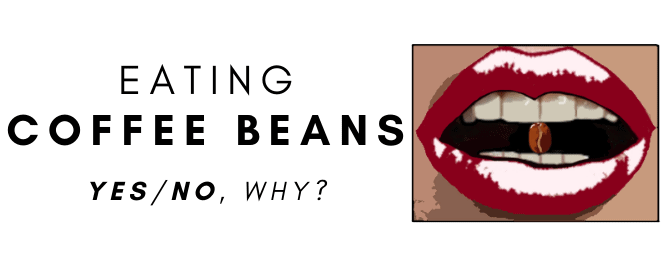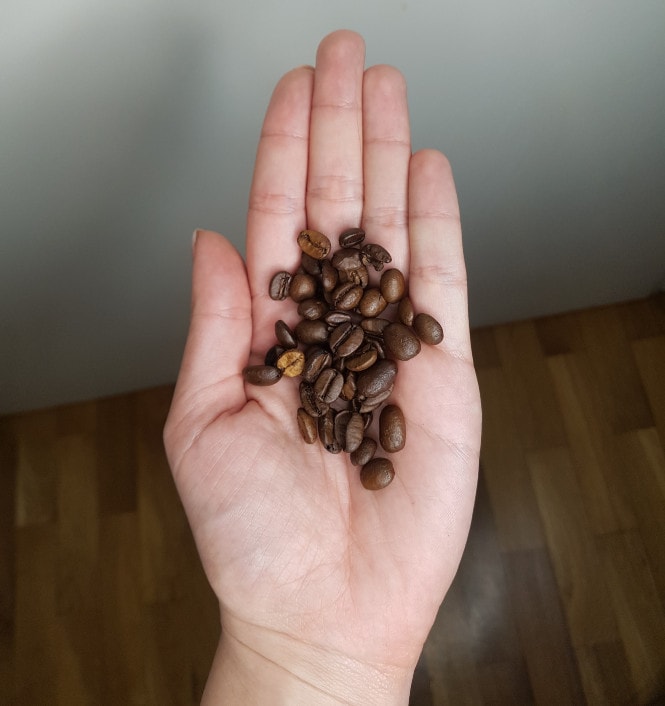Have you ever considered consuming coffee in a non-traditional way?
If you’ve clicked on this post, then you probably wonder if eating coffee beans is worth trying.
I was surprised when I first saw my cousin casually popping a few darkly roasted beans in his mouth and confidently chewing them as if it’s completely normal to do so.
Years later I found out that it’s a common practice among coffee roasters – while they stand around the cooling trey, they’d often eat a couple of beans, which helps them get an idea of how the roast turned out.
Click for Quick Navigation:
- Eating Coffee Beans – Key Points
- Chewing Coffee Beans & Caffeine – How Much, Could it Energize you & More
- Effects on Weight Loss
- The Potential Benefits of Snacking on Coffee Beans
- Eating Coffee Beans – Green or Roasted?
- Drawbacks – What are the Potential Negative Consequences that May be Caused by Coffee Bean Consumption
A fellow roaster told me that chewing the coffee bean helps him tell if it’s is under-, or over- roasted.
I myself, driven by curiosity, have eaten coffee beans, both green and roasted. But is this actually a good idea?
Coffee beans are, in fact, seeds found in the fruits of the Coffea plant, but are there any benefits to chewing them?
There’s some evidence that coffee seeds were first consumed mixed with fat and bolled up to be eaten as an energizing snack.
Nowadays you could easily get a pack of chocolate-covered coffee beans, but is eating them a way to get your caffeine fix?
How much caffeine a coffee bean actually contains?
Could eating a handful of coffee beans promote weight loss?
Is it safe to consume them if you’re pregnant?
Could chewing coffee beans stain your teeth?
There are so many questions, and I’m going to answer every single one of them, so let’s dive in!
Eating Coffee Beans: A Quick Overview
Before I get into the nitty-gritty, for those who are in a hurry, here are the key points when it comes to eating coffee beans:
- Consumption of coffee beans in excess may lead to negative consequences, such as digestive discomfort and increased heart rate.
Nevertheless, it’s generally safe to eat coffee beans, but you should avoid having too many at once. - Coffee beans contain caffeine, so eating them may have a positive impact on your cognitive function, boost your energy levels, and improve your alertness and productivity.
Eating coffee beans may even give you a faster caffeine kick compared to drinking a cup of coffee because, while chewing, the caffeine gets quickly absorbed through the lining of your mouth. - Coffee beans are rich in beneficial compounds, such as chlorogenic acid – a powerful antioxidant that has been linked to a number of health-promoting effects.
By eating a coffee bean you’re ingesting 100% of its beneficial substances.
Comparatively, when you drink a cup of coffee, you’re only getting a portion of said health-promoting compounds, as a part of the beans’ bioactives don’t get extracted; therefore they go to waste.
The same goes with caffeine – when you brew a cup of coffee, you’re not extracting 100% of your grounds’ caffeine, but when you eat the beans – you’re ingesting all the caffeine they contain. - Eating coffee beans may promote weight loss, as the caffeine they contain has been linked to improved endurance during workout, improved metabolism, and an increased rate of fat burning.
- To get the same amount of caffeine as a shot of espresso, you need to eat roughly between 37 to 48 coffee beans.
- A serving of edible chocolate-covered coffee beans usually contains more caffeine than a cup of drip coffee or an espresso shot.
- Chewing or eating coffee beans should be limited during pregnancy, because of their caffeine content.
Caffeine
Coffee beans do contain caffeine, even if decaffeinated.
So if you are to chew or eat your coffee beans, you should know that they will give you a caffeine kick.
If you’re at a place where there’s no coffee available and the circumstances don’t let you prepare a cup, you can have a few coffee beans for energy.
Furthermore, there is evidence that caffeine kicks in faster when absorbed through the lining of the back of your lips and cheeks.
When you chew a coffee bean, it stays in your mouth for longer compared to when you drink coffee.
Therefore, you will likely feel the energizing properties of caffeine quicker if you eat coffee beans.
But How Much Caffeine Is There In a Coffee Bean?
The amount of caffeine a coffee bean contains depends on several factors, including its size and whether it’s Arabica (from the Coffea arabica species), or Robusta (from the Coffea canephora species).
For example, Robusta coffee beans usually contain twice the amount of caffeine of Arabica beans.
But not all Arabica beans have the same amount of caffeine – their exact caffeine concentrations depend on their origin, variety, and genetic make-up.
The roast profile also plays a role when discussing the caffeine content per gram of coffee beans.
According to this scientific report, most coffee beans contain from 10 milligrams to 12 milligrams of caffeine per gram. Nevertheless, some samples (Italian coffee) reached 19.9 milligrams of caffeine per gram.
Anyway, it’s safe to say that 7 to 9 coffee beans weigh about a gram.
Therefore, based on the aforementioned report, a coffee bean should generally contain between 1.1 and 2.8 milligrams of caffeine.
Comparatively, an espresso shot, according to the USDA, contains 63.6 mg. of caffeine.
So in order to get approximately the same amount of caffeine as a shot of espresso, you need to eat between 37 and 48 coffee beans (if we use the 12 mg/g estimation).
To get a better idea of how much is that, here’s a photo of me holding 48 coffee beans:
It’s not a lot, right?
As I mentioned, the effects of caffeine will likely appear quicker if you chew the coffee beans, so don’t go overboard.
During my research I found some anecdotal evidence, indicating that as few as 10 coffee beans are sufficient to notably boost your alertness.
Of course, caffeine affects different individuals differently, so your experience may differ from those of the majority of people.
What’s also worth noting is that the aforementioned caffeine content calculations don’t apply to chocolate-covered coffee beans.
Since the cacao in chocolate contains caffeine too, a single chocolate-covered coffee bean has from 6 to 13 milligrams of caffeine.
Obviously, this amount is much higher compared to a regular roasted bean’s caffeine content of between 1.1 and 2.8 milligrams.
So you should definitely take that into consideration if you’re planning on eating a dozen of chocolate-covered beans like these by SweetGourmet.
Does Snacking on Coffee Beans promote Weight Loss?
Apart from its energizing properties, caffeine may also stimulate fat burning.
There is also evidence that it may boost metabolism.
In other words, eating coffee beans may help you lose weight, because of the caffeine they contain.
While chewing them, the aforementioned bioactive compound will get absorbed through the lining of your mouth, and you will start experiencing the potential positive effects, one of which is improved endurance during workout.
So eating a couple of coffee beans before exercise may help you burn more calories.
Furthermore, coffee beans, both green and roasted, contain chlorogenic acid, which may have a positive influence on the absorption and utilization of glucose from a diet. This may result in a reduced body mass and body fat.
I should mention that chocolate-covered coffee beans usually contain sugar and are more calorie-dense. This may negate the potential positive effects of coffee beans on weight loss.
What’s also worth noting is that you shouldn’t go overboard and consume excessive amounts of coffee beans, as eating too many may have negative consequences (I’m going to go over them in one of the following sections).
Potential Benefits of Eating Coffee beans
Regular consumption of coffee has been linked to a number of health-promoting effects, such as:
- Decreased the risk of type 2 diabetes.
- Anticarcinogenic effects.
- Protection against DNA damage and promotion of weight loss.
- Protection against the risk of Parkinson’s desease.
Eating a reasonable number of coffee beans daily may have the same positive impact on your health as drinking coffee.
After all, the antioxidants and the bioactive compounds in coffee that have been linked to the aforementioned health benefits are present in coffee beans too.
Furthermore, when you prepare a cup of coffee, you can’t really extract 100% of the substances your ground beans contain.
A portion of the “good stuff” will be left in the grounds that are filtered out.
When you chew and eat coffee beans, you are ingesting all their antioxidants, caffeine, and other beneficial compounds that have been linked to coffee’s health-promoting effects.
Green versus Roasted
Green coffee beans are harder to chew and have a taste that most people find unpleasant.
The flavors and aromatics of coffee develop during roasting through caramelization, Maillard reactions, and Strecher degradation.
These processes give the beans nice nutty and sooty flavors which make chewing roasted coffee much more enjoyable.
Now, there is evidence that during roasting coffee loses some of its antioxidant capacity.
Some beneficial substances in coffee (such as its chlorogenic acid) decrease their concentrations during roasting, because of their thermal instability.
There’s conflicting information regarding the influence of coffee roasting on caffeine concentrations. While some sources suggest that during the roasting process the losses of caffeine are only negligible, other studies indicate that roasting significally decreases the amount of caffeine in coffee beans.
So if you’re determined to get the maximum amount of caffeine and antioxidants, go for green or lightly roasted coffee beans when eating them.
On the other hand, green coffee beans are more likely to contain mycotoxins.
These are chemicals formed by molds that may have a negative impact on one’s health if consumed in large quantities.
There is evidence that during the process of roasting, mycotoxin levels are reduced by up to 96%. Therefore, apart from the better flavor, there are other advantages to eating roasted coffee beans instead of green ones.
Is it a Good Idea To Eat Coffee Beans During Pregnancy?
Many women limit coffee consumption during pregnancy because they’re concerned about its caffeine content.
This scientific report suggests that there’s no increased risk of adverse pregnancy if the caffeine consumption is in moderation (300 milligrams per day or less).
Most doctors recommend limiting caffeine consumption during pregnancy to 200 mg. per day.
Therefore you can, in fact, eat coffee beans during pregnancy, but in moderation.
Nevertheless, I recommend consulting your doctor about consuming coffee beans while pregnant.
Possible Negative Effects of Consuming Coffee Beans
Coffee beans contain caffeine, and therefore eating too many of them may have the same negative consequences as those related to overconsumption of caffeine.
These include upset stomach, headache, jitters, insomnia, anxiousness, and fast heart rate.
According to the FDA healthy individuals shouldn’t consume more than 400 mg. of caffeine per day.
In order to exceed this amount, you will have to eat quite a lot of roasted coffee beans, so if you’re only chewing on a small handful, then you’ll be fine.
On the other hand, chocolate-covered coffee beans are usually more caffeinated, so if you’re obsessed with them, I recommend having no more than the recommended serving size, found on the label.
There are few other potential negative consequences to eating excessive amounts of coffee beans.
Coffee consumption has been linked to aggravation of GERD symptoms such as heartburn.
What’s also worth noting is that coffee (both caffeinated and decaffeinated) stimulates colonic motor activity.
In other words, chewing coffee beans may make you poop.
Consequently, eating too many coffee beans at once may lead to diarrhea. So you should definitely be cautious and not go overboard.
Another thing that’s worth discussing is that coffee contains a type of polyphenols called tannins, that contribute to teeth staining.
That’s why dentists recommend drinking coffee with a straw, as this reduces the drink’s contact with your front teeth, which prevents their discoloration.
Chewing coffee beans may lead to teeth staining too, but it’s less likely to affect your front teeth.
Furthermore, tannins are also present in chocolate, so eating coffee beans will likely have a similar influence on the whiteness of your teeth as eating a bar of chocolate.
Final Words
If you haven’t eaten coffee beans yet, now you know that you can try it out.
It’s safe (if in moderation), and chewing them will elevate your energy levels. That’s perfect for when you need a quick caffeine fix, but there’s no way for you to brew a cup of coffee.
I hope that you found my post informative and useful. Feel free to drop me a comment below to share your thoughts.



